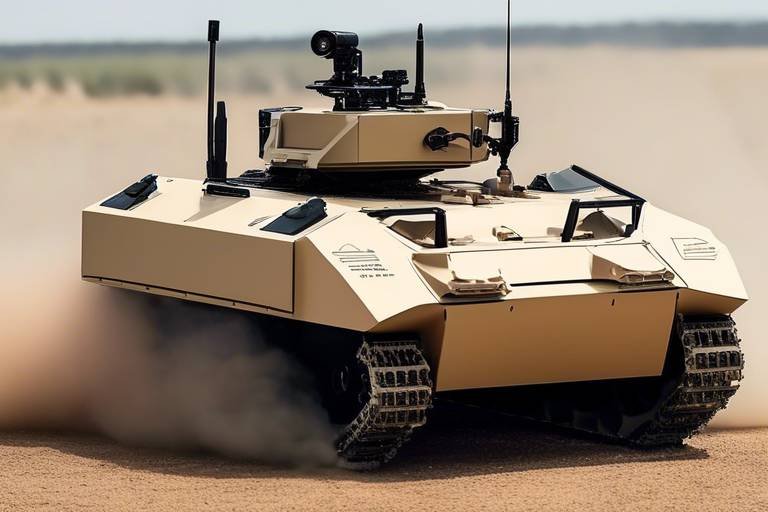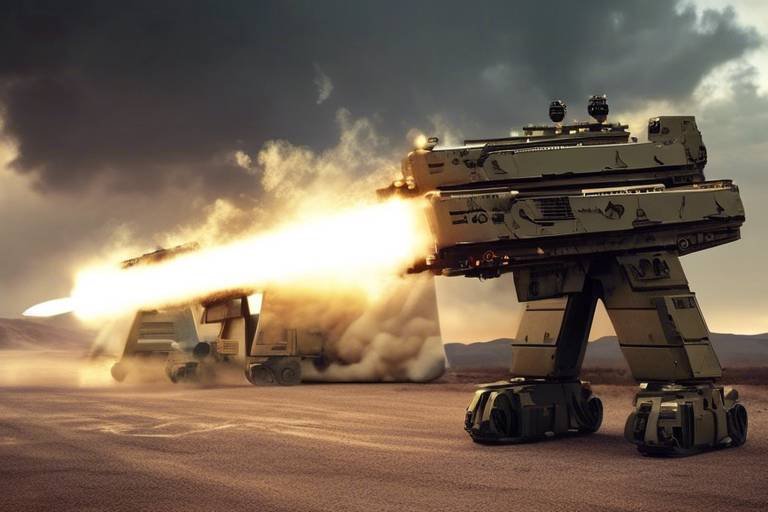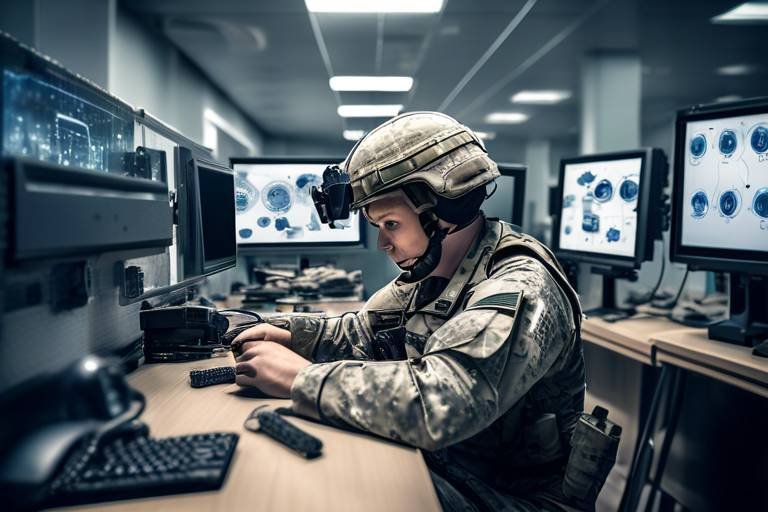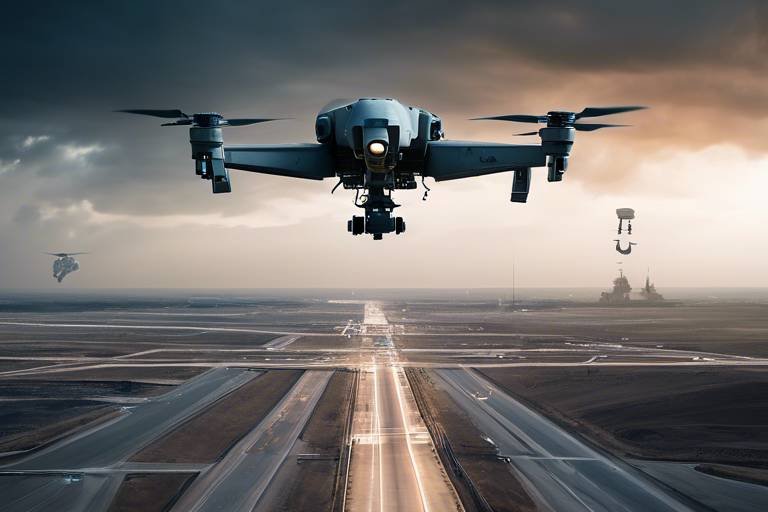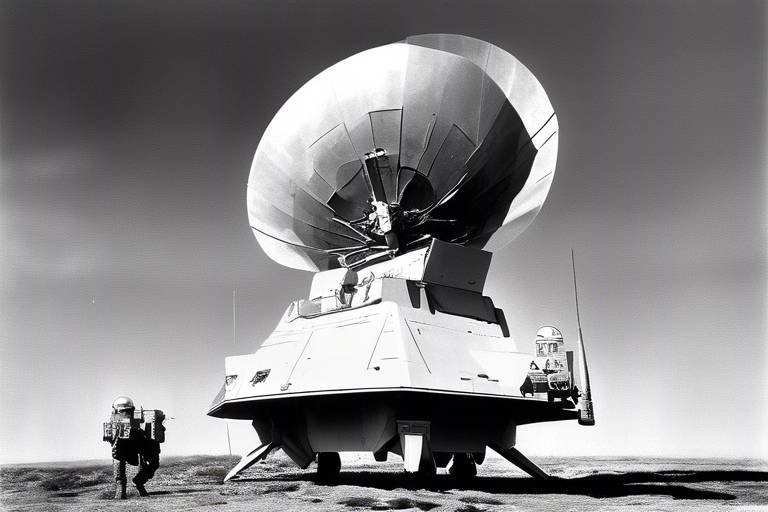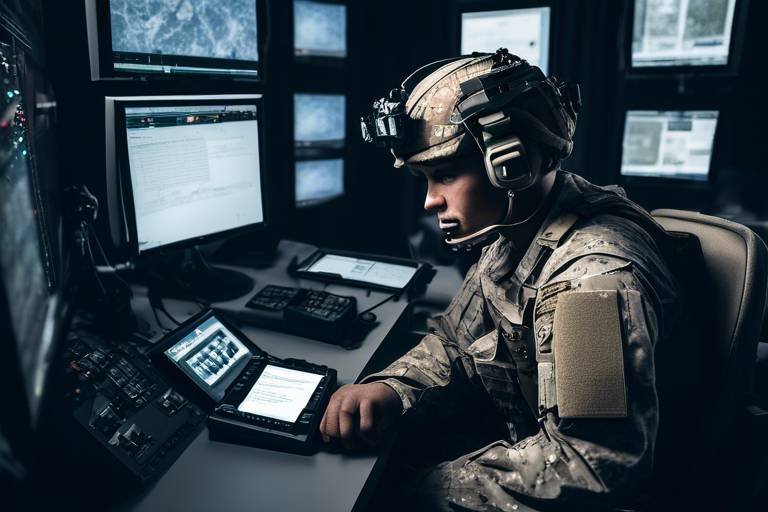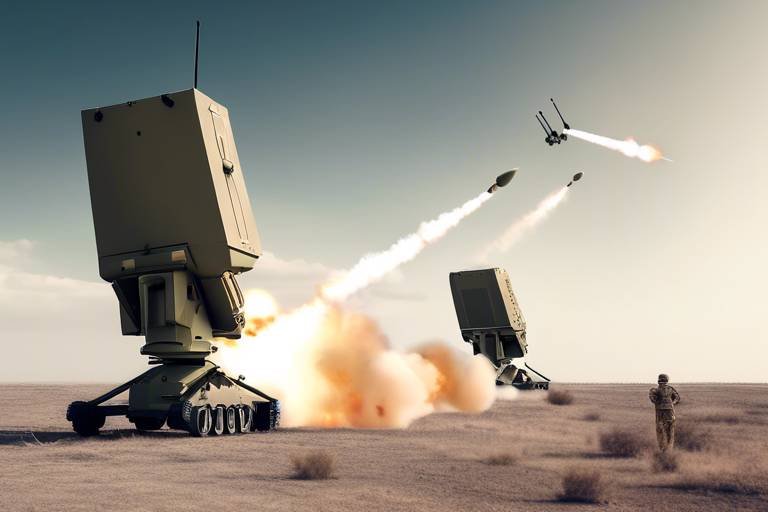AI in Military Healthcare - Revolutionizing Battlefield Medicine
In the modern battlefield, the stakes are higher than ever before. Soldiers face not only the dangers of combat but also the challenges of receiving timely and effective medical care in the heat of battle. Enter artificial intelligence (AI), a game-changer that is revolutionizing military healthcare. With its ability to analyze vast amounts of data, make rapid decisions, and enhance medical practices, AI is transforming how military medicine operates, ultimately improving the well-being of our soldiers.
Imagine a scenario where a soldier is injured in a remote location, far from immediate medical assistance. In the past, this could have led to delayed treatment, risking the soldier's life. However, with AI technologies, medics can now access real-time data and expert consultations at their fingertips. This not only ensures that injured personnel receive the best possible care but also allows for quick decision-making that can be the difference between life and death. The integration of AI in military healthcare is not just a trend; it’s a necessity for modern warfare.
The use of AI in military healthcare encompasses various aspects, from medical decision-making to logistics and training. For instance, AI systems are being deployed to assist in diagnosing injuries and optimizing treatment protocols, ensuring that every soldier receives the most effective care based on their specific needs. This rapid decision-making capability is crucial in high-pressure environments where every second counts.
Moreover, the combination of telemedicine and AI is a powerful force in battlefield medicine. Medics can now engage in real-time consultations with specialists, allowing for expert guidance even in the most isolated locations. This synergy not only enhances the quality of care but also fosters a sense of confidence among battlefield medics, knowing they have access to the best resources available.
Another exciting development is the use of data analytics powered by AI, which enables military healthcare to predict potential health issues among soldiers. By analyzing patterns in health data, military healthcare can take proactive measures to prevent injuries and illnesses before they occur. This predictive capability is vital for maintaining operational readiness and ensuring that soldiers are fit for duty.
The introduction of wearable technology is also making waves in military healthcare. These devices, equipped with AI capabilities, can monitor vital signs in real-time, providing healthcare providers with crucial data. This immediate access to health information allows for prompt interventions, ensuring that any health issues are addressed before they escalate into serious problems.
Furthermore, AI is enhancing medical training for military personnel through realistic simulations. These advanced training programs prepare medics for various scenarios they may encounter on the battlefield, giving them the skills and confidence they need to respond effectively in real-world situations.
On the logistical front, AI is streamlining supply chain management for military healthcare. By optimizing the distribution of medical supplies and equipment, AI ensures that resources are available when and where they are needed most. This efficiency not only saves time but also enhances the overall effectiveness of military operations.
However, the integration of AI in military healthcare is not without its challenges. Ethical considerations regarding data privacy, accountability in decision-making, and potential biases in AI algorithms must be carefully addressed. As we embrace this technological revolution, it’s essential to ensure that the deployment of AI aligns with ethical standards and prioritizes the safety and well-being of soldiers.
Looking ahead, the future of AI in military healthcare is incredibly promising. Ongoing research and development aim to enhance existing capabilities and improve the overall effectiveness of battlefield medicine. As technology continues to evolve, we can expect even more innovative solutions that will further revolutionize how we approach military healthcare, ultimately saving lives and ensuring the well-being of our troops.
- How is AI being used in military healthcare? AI is used for rapid decision-making, telemedicine consultations, predictive analytics, and training simulations, among other applications.
- What are the benefits of using AI in battlefield medicine? AI improves the speed and accuracy of medical responses, enhances training, optimizes logistics, and ultimately saves lives.
- Are there ethical concerns with AI in military healthcare? Yes, issues related to data privacy, decision-making accountability, and algorithmic bias are significant considerations that need to be addressed.
- What future trends can we expect in AI and military medicine? Continued advancements in AI technology will lead to more sophisticated applications in medical care, training, and logistics, enhancing overall effectiveness.

The Role of AI in Medical Decision-Making
In the high-stakes environment of military operations, every second counts. When a soldier is injured, the ability to make quick and accurate medical decisions can mean the difference between life and death. This is where artificial intelligence (AI) steps in, acting like a seasoned medic who never tires, always ready to assist in critical moments. AI systems are being integrated into military healthcare to enhance the decision-making process, ensuring that medics have the right information at their fingertips. Imagine a scenario where a battlefield medic is faced with a traumatic injury—AI can analyze the situation in real-time, providing recommendations for treatment based on a vast database of medical knowledge and previous case studies.
One of the key advantages of AI in this context is its ability to process and analyze large amounts of data quickly. For instance, AI algorithms can evaluate the symptoms presented by a soldier, cross-reference them with a database of injuries, and suggest the most likely diagnosis. This rapid assessment not only speeds up the treatment process but also helps in creating a more effective treatment protocol. The AI can even take into account the soldier's medical history and any existing conditions, tailoring recommendations to fit individual needs. It's akin to having a medical encyclopedia that can instantly provide relevant information, making it an invaluable tool in the field.
Moreover, AI can assist in triage decisions, which are crucial in a battlefield scenario where multiple casualties may occur simultaneously. By evaluating the severity of injuries and predicting outcomes based on historical data, AI can help medics prioritize who needs immediate attention. This ensures that resources are allocated efficiently, maximizing the chances of survival for the most critically injured soldiers. The integration of AI in medical decision-making processes is not just about speed; it's about enhancing the quality of care provided under pressure.
However, the implementation of AI does come with challenges. For example, the accuracy of AI recommendations heavily relies on the quality of data it is trained on. If the data is biased or incomplete, the AI could potentially lead medics astray. Therefore, ongoing training and updates are essential to maintain the reliability of these systems. Additionally, there are ethical considerations regarding the accountability of decisions made by AI. Who is responsible if an AI system makes a recommendation that leads to an adverse outcome? These are questions that military healthcare leaders must address as they incorporate AI into their operations.
In summary, the role of AI in medical decision-making within military healthcare is transformative. By enhancing the speed and accuracy of diagnoses and treatment protocols, AI not only improves the outcomes for injured soldiers but also empowers medics to perform at their best in high-pressure situations. As technology continues to evolve, we can only anticipate even greater advancements in how AI will support military healthcare professionals on the battlefield.
- How does AI improve medical decision-making on the battlefield?
AI analyzes data quickly, providing medics with accurate diagnoses and treatment recommendations, which is crucial in emergency situations. - What are the ethical concerns surrounding AI in military healthcare?
Issues include data privacy, accountability for decisions made by AI, and potential biases in the algorithms. - Can AI be trusted to make medical decisions?
While AI can enhance decision-making, it is important to have human oversight to ensure accuracy and accountability.

Telemedicine and AI: A Powerful Combination
In the fast-paced world of military operations, every second counts, especially when it comes to the health and well-being of our soldiers. Telemedicine has emerged as a groundbreaking solution, allowing healthcare providers to deliver medical assistance from afar. When combined with artificial intelligence, this powerful duo is revolutionizing how medical care is administered on the battlefield. Imagine a scenario where a medic in a remote location can instantly connect with a specialist thousands of miles away, sharing real-time data and receiving expert advice. This is not just a dream; it’s becoming a reality.
The integration of AI into telemedicine enhances the quality of care in several ways. For starters, AI algorithms can analyze patient data, including vital signs and medical history, to provide actionable insights during consultations. This means that even if a medic is faced with a complex case, they have the support of AI to guide their decision-making process. Consider this: an AI system can quickly assess a soldier's condition and suggest the most effective treatment options, all while the medic is on the ground, making real-time adjustments based on the situation.
Moreover, telemedicine powered by AI can facilitate remote training for medics, ensuring they are well-prepared for any situation they might encounter. Through virtual simulations and interactive platforms, medics can practice their skills and receive feedback from experienced professionals without the need for physical presence. This not only saves time but also ensures that medics are always at the top of their game, ready to respond to emergencies.
One of the most impressive aspects of this combination is the ability to monitor soldiers' health continuously. With the help of wearable devices equipped with AI capabilities, soldiers can have their vital signs tracked in real-time. This data can be transmitted instantly to healthcare providers, allowing for immediate intervention if any abnormalities are detected. For instance, if a soldier's heart rate spikes or blood pressure drops dangerously low, the AI system can alert the medic, prompting them to take action before the situation escalates.
In addition, the remote nature of telemedicine means that soldiers deployed in isolated areas can access healthcare without the need for lengthy evacuations. This not only saves valuable time but also minimizes the risks associated with transporting injured personnel. With AI analyzing data and providing recommendations, soldiers can receive appropriate care right where they are, significantly improving their chances of recovery.
As we move forward, the synergy between telemedicine and AI is set to expand even further. Continuous advancements in technology will enhance the capabilities of both fields, leading to more efficient healthcare delivery on the battlefield. The potential for improved patient outcomes is immense, making this combination not just a trend, but a crucial element in the future of military healthcare.
- How does telemedicine work in military healthcare? Telemedicine allows healthcare providers to connect with soldiers in remote locations through video calls and data sharing, facilitating immediate medical consultations.
- What role does AI play in telemedicine? AI enhances telemedicine by analyzing patient data, providing diagnostic support, and suggesting treatment options in real-time during consultations.
- Can telemedicine reduce the need for evacuation? Yes, telemedicine can provide immediate care on-site, reducing the need for transporting injured soldiers to medical facilities.
- What are the benefits of using wearable technology in military healthcare? Wearable devices monitor vital signs in real-time, allowing for proactive health management and immediate intervention when necessary.

Data Analytics for Predictive Healthcare
In the ever-evolving landscape of military healthcare, data analytics stands out as a game-changer, particularly in the realm of predictive healthcare. Imagine a world where medical professionals can foresee potential health issues before they escalate into serious conditions. This is not just a fantasy; it's becoming a reality thanks to the power of artificial intelligence and advanced data analytics. By analyzing vast amounts of data collected from various sources, military healthcare systems are now equipped to identify trends and patterns that can indicate impending health crises among soldiers.
One of the most significant advantages of utilizing AI-driven data analytics is the ability to implement proactive measures. For instance, by examining historical health records, environmental factors, and even stress levels, AI can predict which soldiers may be at higher risk for injuries or illnesses. This predictive capability allows medical teams to intervene early, providing targeted support and resources that can significantly enhance a soldier's well-being and operational readiness.
Consider the following table, which outlines how predictive analytics can transform various aspects of military healthcare:
| Aspect | Traditional Approach | AI-Driven Predictive Approach |
|---|---|---|
| Injury Prevention | Reactive measures after injuries occur | Proactive identification of at-risk individuals |
| Health Monitoring | Periodic check-ups | Continuous real-time monitoring and alerts |
| Treatment Plans | Standardized protocols | Personalized treatment based on predictive data |
This table highlights a stark contrast between traditional methods and the innovative, data-driven approach. With traditional healthcare, responses often come too late, only after a soldier has sustained an injury or fallen ill. In contrast, the AI-driven predictive approach is like having a crystal ball that allows healthcare providers to anticipate and mitigate risks before they manifest. This not only saves lives but also enhances the overall efficiency of military operations.
Moreover, the integration of AI in data analytics fosters a culture of continuous improvement. As more data is collected and analyzed, algorithms become increasingly refined, leading to even more accurate predictions. This creates a feedback loop where healthcare practices evolve based on real-world outcomes, ensuring that military personnel receive the best possible care tailored to their unique circumstances.
In conclusion, the role of data analytics in predictive healthcare within the military context is not just a technological advancement; it is a revolutionary shift towards a more proactive, efficient, and effective healthcare system. By harnessing the power of AI, military healthcare can significantly enhance soldier safety and readiness, ensuring that our troops are not only prepared for battle but also supported in their health and well-being.
- What is predictive healthcare? Predictive healthcare uses data analytics and AI to anticipate potential health issues before they arise, allowing for early intervention.
- How does AI improve military healthcare? AI enhances decision-making, optimizes treatment protocols, and enables continuous monitoring of soldiers' health.
- What are the benefits of using data analytics in military medicine? Benefits include improved injury prevention, personalized treatment plans, and enhanced operational readiness.
- Can predictive analytics reduce healthcare costs? Yes, by preventing injuries and illnesses before they occur, predictive analytics can lead to significant cost savings in military healthcare.

Wearable Technology and Monitoring
Imagine being on the battlefield, adrenaline pumping, and the stakes at an all-time high. In such scenarios, every second counts, and the health of our soldiers can hang in the balance. This is where wearable technology steps in as a game-changer. Equipped with advanced sensors and AI capabilities, these devices are not just accessories; they are lifelines. They continuously monitor vital signs such as heart rate, body temperature, and even oxygen saturation, providing real-time data to medics and healthcare providers.
But how does this technology actually work? Picture a soldier wearing a smartwatch that tracks their physiological metrics. If something goes awry—say, their heart rate spikes or their body temperature rises above normal thresholds—the device sends an alert to the medic nearby. This instant feedback can mean the difference between life and death. By having immediate access to critical health data, medics can make informed decisions quickly, ensuring timely interventions.
Moreover, the data collected from these wearables can be aggregated and analyzed using AI algorithms. This not only helps in understanding the immediate health status of individual soldiers but also contributes to broader insights about the health trends within units. For instance, if several soldiers report similar symptoms, it might indicate an emerging health issue that needs to be addressed—like heat exhaustion or the onset of an infection.
In addition to monitoring health metrics, wearable technology can also assist in tracking a soldier's physical performance. This is particularly important during training exercises, where understanding fatigue levels can help prevent injuries. By analyzing the data collected during these sessions, military healthcare professionals can tailor training programs to better suit the physical capabilities of each soldier, thereby enhancing their overall readiness.
As we look to the future, the integration of wearable technology in military healthcare is likely to expand. Innovations such as smart textiles—clothing embedded with sensors—are already in development. These garments could provide even more comprehensive monitoring, seamlessly integrating health data collection into soldiers' daily uniforms. The potential for enhancing soldier well-being through technology is boundless, making it an exciting frontier in military medicine.
- What types of wearable technology are used in military healthcare? Wearable technology in military healthcare includes smartwatches, fitness trackers, and smart textiles equipped with sensors to monitor vital signs.
- How does wearable technology improve battlefield medicine? It provides real-time health data to medics, enabling them to make quick and informed decisions, which can significantly enhance patient outcomes.
- Can wearable technology predict health issues? Yes, by analyzing trends in the collected data, AI can help predict potential health problems, allowing for proactive measures to be taken.
- Is the data from wearables secure? Data security is a critical concern, and military healthcare systems are continuously working to ensure that sensitive health information is protected.

AI in Medical Training and Simulation
Artificial Intelligence (AI) is not just a buzzword in the tech world; it's a game-changer in military medical training and simulation. Imagine a world where medics can practice their skills in a hyper-realistic environment, where every scenario is tailored to challenge their decision-making abilities and technical skills. This is no longer a distant dream; it's happening right now! AI-driven simulations are transforming how military personnel prepare for the unpredictable chaos of the battlefield.
One of the most significant advantages of AI in training is its ability to create adaptive learning environments. These systems can analyze a trainee's performance in real-time and adjust the difficulty level of the scenarios accordingly. For example, if a medic excels at treating gunshot wounds but struggles with triage, the AI can introduce more complex triage situations, ensuring that the medic receives targeted practice where they need it most. This personalized approach not only enhances learning but also boosts confidence, which is crucial in high-stakes environments.
Moreover, AI-powered simulations can replicate various battlefield conditions, including environmental factors like noise, chaos, and even the emotional stress of real combat. This immersive experience is vital for preparing medics to perform under pressure. The ability to rehearse procedures in a safe yet realistic setting allows them to refine their skills and make critical decisions without the fear of real-world consequences.
But how does this all work? AI algorithms analyze vast amounts of data from previous training sessions, identifying patterns in the trainees' performance. This data-driven approach allows for the creation of realistic scenarios that mimic the complexities of actual medical emergencies. For instance, a simulation might involve multiple casualties with different types of injuries, requiring the medic to prioritize care effectively. Such scenarios not only test technical skills but also enhance critical thinking and teamwork, both of which are essential in the field.
Furthermore, the integration of virtual reality (VR) and augmented reality (AR) with AI is pushing the boundaries of medical training. These technologies offer an immersive experience, allowing medics to visualize anatomy and practice procedures in a 3D environment. Imagine donning a VR headset and being transported to a battlefield where you must perform lifesaving procedures on virtual patients. This level of engagement keeps trainees motivated and enhances knowledge retention.
As AI continues to evolve, its role in military medical training is expected to expand. Future innovations may include more sophisticated simulations that incorporate AI-driven avatars acting as patients, providing realistic feedback based on the trainee's actions. This could lead to even more effective training programs that prepare medics for the challenges they will face in real-world situations.
In conclusion, AI is revolutionizing medical training and simulation for military personnel, creating a new era of preparedness. With its ability to provide tailored experiences, replicate real-world scenarios, and enhance engagement through advanced technologies, AI is paving the way for a more skilled and confident medical force. As we look to the future, the potential applications of AI in this field are virtually limitless, promising to save lives on the battlefield and beyond.
- What is the main benefit of AI in medical training? AI allows for personalized training experiences that adapt to the learner's needs, enhancing skill development and confidence.
- How does AI improve simulation realism? AI analyzes data from past training sessions to create scenarios that mimic real-world complexities, including stress and chaotic environments.
- What technologies are integrated with AI for training? Virtual reality (VR) and augmented reality (AR) are often combined with AI to provide immersive and engaging training experiences.
- Will AI replace human instructors in medical training? While AI enhances training, it is not likely to replace human instructors entirely, as human oversight and mentorship remain crucial.

AI-Driven Logistics and Supply Chain Management
In the fast-paced world of military operations, logistics plays a crucial role in ensuring that soldiers have the necessary resources to perform their duties effectively. With the advent of artificial intelligence, military logistics is undergoing a significant transformation. AI technologies are being harnessed to streamline supply chain management, making it more efficient and responsive to the dynamic needs of the battlefield. Imagine a world where every piece of medical equipment and supply is precisely where it needs to be, exactly when it’s needed. This is not just a dream; it's becoming a reality thanks to AI.
One of the key advantages of AI in logistics is its ability to analyze vast amounts of data in real-time. By leveraging predictive analytics, military healthcare logistics can anticipate the needs of medical teams based on various factors such as troop movements, historical data, and even weather conditions. For instance, if a unit is deployed to a remote area where injuries are likely to occur, AI can predict an uptick in medical supply needs and ensure that the necessary items are pre-positioned. This not only saves time but also enhances the overall operational readiness of military healthcare.
Moreover, AI-driven logistics systems can optimize routes for supply delivery, ensuring that medical supplies reach their destinations as quickly as possible. Traditional logistics often faces challenges such as traffic, terrain, and unforeseen obstacles. AI algorithms can process these variables and suggest alternative routes, minimizing delays. This capability is particularly vital in combat situations where every second counts. The integration of AI into logistics can be likened to having a highly skilled navigator who can adapt to changing conditions and guide resources to where they are most needed.
Additionally, AI can facilitate better inventory management. By employing machine learning algorithms, military healthcare can maintain optimal stock levels of medical supplies, reducing waste and ensuring that critical items are always available. For example, if a certain medication is frequently used during a specific operation, AI can trigger automatic reordering when stock levels fall below a predetermined threshold. This proactive approach to inventory management not only saves money but also ensures that soldiers receive timely medical care.
The impact of AI on logistics doesn’t stop at inventory and delivery. It extends to the entire supply chain, from procurement to distribution. By analyzing supplier performance and market trends, AI can help military healthcare organizations make informed decisions about where and how to source medical supplies. This strategic approach enables them to build resilient supply chains that can withstand the pressures of military operations.
In summary, AI-driven logistics and supply chain management is revolutionizing the way military healthcare operates. By enhancing predictive capabilities, optimizing delivery routes, and improving inventory management, AI ensures that medical resources are available when and where they are needed most. As we look to the future, it’s clear that the integration of AI in military logistics will continue to evolve, promising even greater efficiencies and improved outcomes for our soldiers on the battlefield.
- How does AI improve military logistics?
AI enhances military logistics by providing real-time data analysis, optimizing supply routes, and improving inventory management, ensuring that resources are available when needed. - What role does predictive analytics play in military healthcare?
Predictive analytics allows military healthcare to anticipate supply needs based on various factors, enabling proactive measures to ensure readiness. - Can AI help reduce waste in military supply chains?
Yes, by maintaining optimal stock levels and automating reordering processes, AI can significantly reduce waste in military supply chains. - Is AI in military logistics reliable?
AI systems are designed to analyze vast amounts of data with high accuracy, making them reliable tools for enhancing logistics efficiency.

Ethical Considerations in AI Deployment
The integration of artificial intelligence (AI) into military healthcare is not just a technological advancement; it also brings forth a myriad of ethical considerations that must be navigated with care. As we embrace the potential of AI to enhance battlefield medicine, we must also grapple with the implications it has on data privacy, accountability, and the potential for bias in decision-making processes. These concerns are not merely theoretical; they have real-world consequences that can affect the lives of soldiers and the integrity of military operations.
One of the primary ethical dilemmas revolves around data privacy. AI systems rely heavily on data to function effectively, often requiring access to sensitive personal health information of soldiers. The question arises: how is this data collected, stored, and protected? There is a fine line between utilizing data for the greater good and infringing upon individual privacy rights. Military organizations must establish stringent protocols to safeguard this information, ensuring that it is used solely for medical purposes and not for other, potentially invasive, applications.
Another crucial aspect is accountability. When AI systems make decisions regarding medical treatment or triage, who is responsible if something goes wrong? Is it the AI developers, the military personnel utilizing the technology, or the institutions that implemented these systems? This ambiguity can create a troubling scenario where accountability is diluted, leading to a potential erosion of trust in military healthcare. Clear guidelines and policies must be established to delineate responsibility and ensure that human oversight remains a key component of AI deployment.
Moreover, the potential for bias in AI algorithms poses a significant ethical challenge. AI systems learn from data, and if that data is skewed or lacks diversity, the outcomes can be biased. This is particularly concerning in military healthcare, where decisions can have life-or-death consequences. For example, if an AI system is trained predominantly on data from a specific demographic, it may not perform as well for soldiers from different backgrounds. To mitigate this risk, it’s essential to use diverse datasets and continuously monitor AI systems for fairness and accuracy.
To address these ethical considerations, military healthcare organizations can implement a framework that includes:
- Data Governance: Establishing strict policies for data usage, access, and protection.
- Transparency: Ensuring that AI algorithms and their decision-making processes are transparent and understandable.
- Continuous Monitoring: Regularly assessing AI systems for bias and efficacy, making adjustments as necessary.
- Training and Awareness: Educating military personnel on the ethical implications of using AI in healthcare.
As we look to the future, the ethical deployment of AI in military healthcare will be paramount. It’s not just about harnessing technology for improved medical outcomes; it’s about doing so in a way that respects the rights and dignity of every soldier. Balancing innovation with ethical responsibility will be the key to successfully integrating AI into military medicine.
- What are the main ethical concerns regarding AI in military healthcare? The primary concerns include data privacy, accountability for decisions made by AI, and the potential for bias in AI algorithms.
- How can military organizations protect soldiers' data privacy? By establishing strict data governance policies and ensuring that data is used solely for medical purposes.
- Who is accountable if an AI system makes a mistake? This remains a complex issue, necessitating clear guidelines to define responsibility among developers, users, and institutions.
- How can bias in AI systems be mitigated? By using diverse datasets for training and continuously monitoring AI for fairness and accuracy.

Future Trends in AI and Military Medicine
As we stand on the brink of a technological revolution, the future of AI in military medicine looks incredibly promising. With each passing day, advancements in artificial intelligence are reshaping how we approach healthcare on the battlefield. Imagine a world where medics can diagnose and treat injuries with the precision of a seasoned doctor, all thanks to AI-powered tools. This isn't just a dream; it's quickly becoming a reality.
One of the most exciting trends is the integration of machine learning algorithms that can analyze vast amounts of data in real-time. These algorithms will not only assist in diagnosing conditions but will also predict potential health risks based on soldiers' historical health data. For instance, if a soldier has a history of heat-related illnesses, AI can alert medics to monitor them more closely during high-temperature operations. This proactive approach could save lives and enhance operational efficiency.
Furthermore, the rise of augmented reality (AR) and virtual reality (VR) technologies in training scenarios is another trend worth noting. Imagine a medic in training, donning a VR headset and stepping into a hyper-realistic battlefield simulation where they can practice life-saving procedures without any real-world consequences. This immersive training can dramatically improve their skills and readiness, ensuring they are fully prepared when the stakes are high.
Additionally, the future will likely see a greater emphasis on collaborative AI systems that facilitate communication between different military branches and healthcare providers. These systems will allow for seamless sharing of medical records and treatment plans, ensuring that every medic, regardless of their location, has access to the best possible information. This could be particularly beneficial in joint operations, where coordination between various military units is crucial.
As we look ahead, it’s essential to consider the role of ethical AI. With the increasing reliance on AI systems, ensuring that these technologies are developed and implemented responsibly will be paramount. This includes addressing concerns about data privacy, algorithmic bias, and the accountability of AI-driven decisions. Policymakers and military leaders must work hand-in-hand to establish guidelines that protect soldiers while harnessing the full potential of AI.
In summary, the future trends in AI and military medicine are not just about technological advancements; they represent a shift towards a more efficient, responsive, and ethical approach to healthcare in the military. As we continue to innovate and adapt, the potential to improve soldier well-being and operational readiness is boundless.
- What is the role of AI in military healthcare? AI assists in decision-making, enhances telemedicine, and improves training for military medical personnel.
- How does AI improve medical training? AI provides realistic simulations that prepare medics for various battlefield scenarios, enhancing their skills and confidence.
- What ethical concerns are associated with AI in military medicine? Key concerns include data privacy, decision-making accountability, and potential biases in AI algorithms.
- What future technologies might impact military healthcare? Technologies such as augmented reality, virtual reality, and advanced machine learning are expected to play significant roles.
Frequently Asked Questions
-
What is the role of AI in military healthcare?
AI plays a crucial role in military healthcare by enhancing medical decision-making, allowing for quicker diagnoses and optimized treatment protocols. This is especially important in high-pressure environments like the battlefield, where every second counts.
-
How does telemedicine integrate with AI in military settings?
Telemedicine, when combined with AI, enables real-time consultations between battlefield medics and specialists. This integration improves access to expert medical advice, ensuring that soldiers receive the best possible care, even in remote locations.
-
Can AI predict health issues in soldiers?
Absolutely! AI-driven data analytics can analyze various health metrics to predict potential issues before they arise. This proactive approach helps maintain soldiers' operational readiness by preventing injuries and illnesses.
-
What types of wearable technology are used in military healthcare?
Wearable devices equipped with AI can monitor vital signs such as heart rate, temperature, and oxygen levels in real-time. This data is crucial for healthcare providers, enabling immediate intervention when necessary.
-
How is AI changing medical training for military personnel?
AI technologies are revolutionizing medical training by providing realistic simulations that prepare medics for various battlefield scenarios. This hands-on experience enhances their skills and confidence in real-life situations.
-
What impact does AI have on military logistics and supply chains?
AI streamlines logistics in military healthcare by optimizing the supply chains for medical supplies and equipment. This ensures that resources are available precisely when and where they are needed, enhancing overall efficiency.
-
What ethical considerations arise from using AI in military healthcare?
The integration of AI raises important ethical questions, such as data privacy, accountability in decision-making, and the potential for bias in AI algorithms. These issues must be carefully addressed to ensure responsible use of technology.
-
What does the future hold for AI in military medicine?
The future of AI in military healthcare looks promising, with ongoing research aimed at enhancing capabilities and improving the effectiveness of battlefield medicine. Innovations in AI are expected to continue transforming how military healthcare operates.


